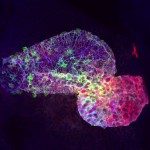Lien vers Pubmed [PMID] – 3261590
Arthritis Rheum. 1988 Aug; 31(8): 964-72
We examined the effect of D-penicillamine (DP) and copper sulfate (CuSO4) on human fibroblast proliferation in vitro. DP plus CuSO4 inhibited both basal and interleukin-1 (IL-1)-induced tritiated thymidine incorporation into fibroblasts in a dose- and time-dependent manner. Significant inhibition was observed at the level of 60 microM in the presence of 4 microM CuSO4. At this range of concentrations, which is attained in serum and in tissues of treated patients, DP alone or CuSO4 alone did not affect fibroblast proliferation. Similar inhibition was observed with various thiols in the presence of copper, but not with disulfides such as DP disulfide or oxidized glutathione. Inhibition of fibroblast DNA synthesis induced by DP and CuSO4 was reversed by the simultaneous addition of catalase or horseradish peroxidase, but not by boiled catalase or superoxide dismutase. The inhibition by DP and CuSO4, therefore, may be attributable to hydrogen peroxide produced by these 2 agents. DP, in the presence of CuSO4, did not affect IL-1 secretion from human peripheral mononuclear phagocytes. These observations indicate that hydrogen peroxide produced by DP plus CuSO4 inhibits IL-1-induced fibroblast proliferation by directly affecting fibroblasts, without alteration of IL-1 secretion from mononuclear phagocytes. Thus, DP may play a role in inhibiting the growth of rheumatoid pannus and excessive collagenation in scleroderma by direct inhibition of fibroblast proliferation.

